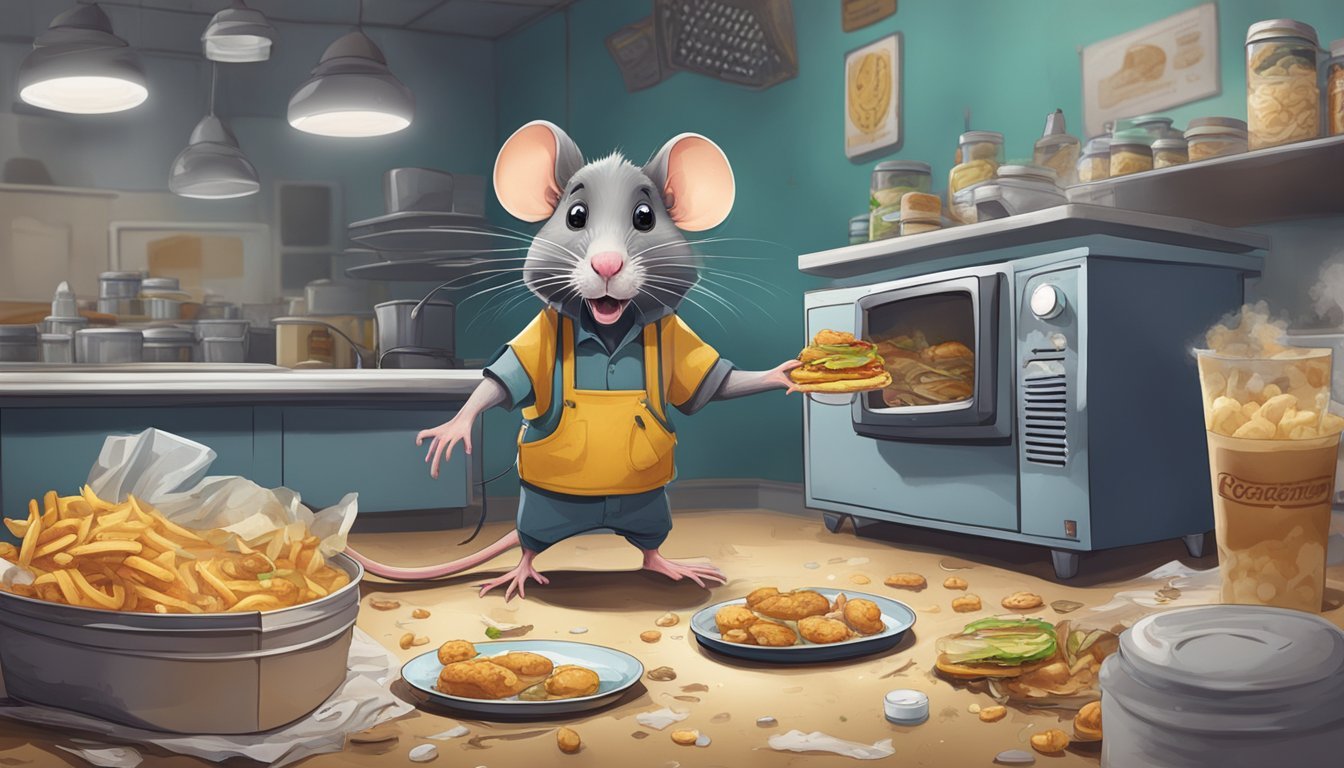7 Eye-Opening Documentaries for Fast Food Workers
Essential Viewing to Understand the Industry
Food documentaries offer powerful insights into the complex world of food production, consumption, and industry practices. They shed light on important issues that often go unnoticed by the average consumer, from agricultural methods to labor conditions.
For fast food workers, certain documentaries can be particularly eye-opening. These films provide valuable context about the broader food system that fast food is part of, potentially influencing how workers view their roles and the industry as a whole. By exploring topics like supply chains, corporate practices, and health impacts, these documentaries equip viewers with knowledge that extends far beyond the kitchen or counter.
1) Super Size Me (2004)
Morgan Spurlock's documentary "Super Size Me" shocked viewers with its exploration of fast food's health impacts. For 30 days, Spurlock ate only McDonald's meals, documenting the effects on his body and mind.
The film highlights the prevalence of fast food in American culture and its role in the obesity epidemic. Spurlock gains significant weight and experiences concerning health changes during the experiment.
"Super Size Me" examines marketing tactics used by fast food companies, especially those targeting children. It also delves into school lunch programs and their reliance on processed foods.
The documentary sparked widespread discussion about food industry practices and personal dietary choices. It influenced some viewers to reconsider their fast food consumption habits.
After its release, McDonald's eliminated its "Super Size" option and introduced more salads and fruit options to its menu. The film remains a thought-provoking look at fast food culture and its consequences.
More information on Super Size Me
2) Food, Inc. (2008)
Food, Inc. exposes the hidden realities of the American food industry. Directed by Robert Kenner, this documentary sheds light on corporate farming practices and their impact on health, workers, and the environment.
The film reveals how a handful of corporations control the majority of food production in the United States. It examines the use of industrial farming techniques and their effects on food safety and quality.
Food, Inc. also explores the treatment of animals in factory farms and the working conditions of laborers in the food industry. It raises questions about the sustainability of current agricultural practices.
The documentary features interviews with farmers, food experts, and industry insiders. It provides a comprehensive look at the complex issues surrounding food production and distribution in America.
For fast food workers, Food, Inc. offers valuable insights into the origins of the products they handle daily. It encourages critical thinking about food choices and their wider implications.
More information on Food, Inc.
3) The Big Fat Fix (2016)
The Big Fat Fix challenges conventional wisdom about diet and health. This documentary features Dr. Aseem Malhotra and Donal O'Neill as they explore the Mediterranean lifestyle's impact on well-being.
The film questions the long-held belief that low-fat diets are best for health. It presents evidence suggesting that high-fat, low-carb diets may be more beneficial for many people.
Beyond nutrition, The Big Fat Fix examines other aspects of a healthy lifestyle. It emphasizes the importance of regular exercise, stress reduction, and quality sleep for overall health.
Dr. Malhotra demonstrates how lifestyle changes can improve health in as little as 21 days. The documentary covers topics such as the benefits of coconut oil and the potential issues with some olive oil products.
The Big Fat Fix encourages viewers to reconsider their approach to food and health. It promotes mindful eating and reconnecting with natural, whole foods as part of a holistic approach to wellness.
More information about The Big Fat Fix
4) The Founder
"The Founder" (2016) tells the story of Ray Kroc and the creation of the McDonald's fast food empire. The film stars Michael Keaton as Kroc, a struggling salesman who encounters the McDonald brothers' efficient burger restaurant in California.
Kroc recognizes the potential of the McDonald's concept and convinces the brothers to let him franchise the business. The movie depicts his ambitious drive to expand the brand nationwide, often at the expense of his personal relationships and business ethics.
The documentary explores the tension between Kroc's vision for growth and the McDonald brothers' commitment to quality. It highlights the legal and moral conflicts that arose as Kroc maneuvered to gain control of the company.
"The Founder" offers insight into the early brand strategy and business practices that shaped McDonald's into a global fast food giant. It raises questions about the nature of success and the price of ambition in the corporate world.
More information on "The Founder" (IMDB)
5) Forks Over Knives (2011)
Forks Over Knives examines the potential health benefits of a plant-based diet. The documentary features Dr. T. Colin Campbell and Dr. Caldwell Esselstyn, who argue that many chronic diseases can be prevented or reversed by adopting a whole-food, plant-based diet.
The film presents scientific research and personal stories to support its claims. It challenges conventional dietary advice and explores the relationship between animal-based foods and various health issues.
Forks Over Knives critiques the standard American diet and its reliance on processed foods and animal products. It suggests that a diet centered on fruits, vegetables, whole grains, and legumes can lead to improved health outcomes.
The documentary showcases individuals who have experienced significant health improvements after changing their diets. It also addresses the environmental impact of food choices and the potential benefits of plant-based eating for sustainability.
For fast food workers, Forks Over Knives offers a thought-provoking perspective on nutrition and health. It encourages viewers to reconsider their food choices and explore plant-based alternatives.
More information on Forks Over Knives
6) Rats (2016)
This documentary explores the complex relationship between humans and rats in urban environments. Filmmaker Morgan Spurlock delves into the world of these resilient creatures, revealing their impact on cities worldwide.
The film showcases various locations, including New York City, Mumbai, and New Orleans. It examines how rats have adapted to thrive alongside human populations and the challenges they pose to public health and sanitation.
Experts featured in the documentary discuss rat behavior, intelligence, and their ability to survive in harsh conditions. The film also highlights the efforts of pest control professionals and researchers working to manage rat populations.
"Rats" provides a thought-provoking look at these often-reviled animals and their place in our urban ecosystems. It challenges viewers to reconsider their perceptions of rats and their role in human society.
7) Fat, Sick & Nearly Dead (2010)
This documentary follows Australian Joe Cross on a 60-day juice fast across the United States. Cross, overweight and suffering from an autoimmune disease, embarks on this journey to regain his health under the guidance of Dr. Joel Fuhrman.
The film showcases the potential benefits of a plant-based diet and juicing. It highlights Cross's transformation as he loses weight and reduces his medication intake. Along the way, he inspires others to make similar lifestyle changes.
One such person is Phil Staples, a morbidly obese truck driver Cross meets during his travels. Staples later adopts a juice fast and experiences significant health improvements.
The documentary emphasizes the importance of whole foods and nutrition in combating obesity and chronic diseases. It presents juicing as a method to reset eating habits and jumpstart a healthier lifestyle.
More information on Fat, Sick & Nearly Dead
The Influence of Fast Food on Health
Fast food consumption has significant effects on both consumers and workers in the industry. Its nutritional profile and widespread availability contribute to various health challenges.
Nutritional Challenges Faced by Workers
Fast food workers often face unique dietary risks due to their work environment. Regular exposure to high-calorie, high-fat meals can lead to overconsumption. Many workers rely on complimentary or discounted meals during shifts, potentially increasing their intake of processed foods.
Limited time for proper meals may result in rushed eating habits. This can contribute to poor digestion and nutrient absorption. Some workers report difficulty maintaining balanced diets due to irregular schedules and late-night shifts.
Long-Term Health Impacts
Consistent fast food consumption is linked to several long-term health issues. Obesity rates are higher among frequent fast food eaters, increasing risks of cardiovascular diseases and diabetes.
High sodium content in many fast food items may contribute to hypertension. Excessive sugar intake from sodas and desserts can lead to dental problems and metabolic disorders.
Studies show that a diet high in processed meats and fried foods may increase cancer risks. Regular fast food consumption is also associated with higher rates of depression and anxiety in some populations.
Fast food workers may be at elevated risk for these health issues due to increased exposure and consumption.
Understanding Corporate Practices
Fast food documentaries expose key corporate practices that shape the industry. These films reveal insights into labor policies, employee rights, and sustainability efforts by major chains.
Labor Policies and Employee Rights
Many documentaries highlight the challenging working conditions in fast food. Low wages, lack of benefits, and limited advancement opportunities are common themes. Films often feature interviews with current and former employees discussing their experiences.
Some documentaries explore unionization efforts and legal battles over worker classification. The fight for a higher minimum wage is frequently covered. Safety concerns, such as risks of burns and injuries, are also examined.
Scheduling practices like "clopening" shifts and inconsistent hours receive scrutiny. The struggles of single parents and students to balance work and other responsibilities are portrayed.
Sustainability Initiatives
Fast food chains' environmental impact is a major focus of many films. Documentaries investigate packaging waste, energy usage in restaurants, and transportation emissions from supply chains.
Plant-based menu options and efforts to reduce meat consumption are highlighted. Some films praise chains adopting more sustainable practices, while others criticize "greenwashing."
Water usage in food production and restaurant operations is examined. Deforestation linked to beef and soy production for animal feed is often discussed.
Documentaries also cover initiatives to source more ingredients locally and use organic produce. Efforts to improve animal welfare standards in supply chains receive attention.






